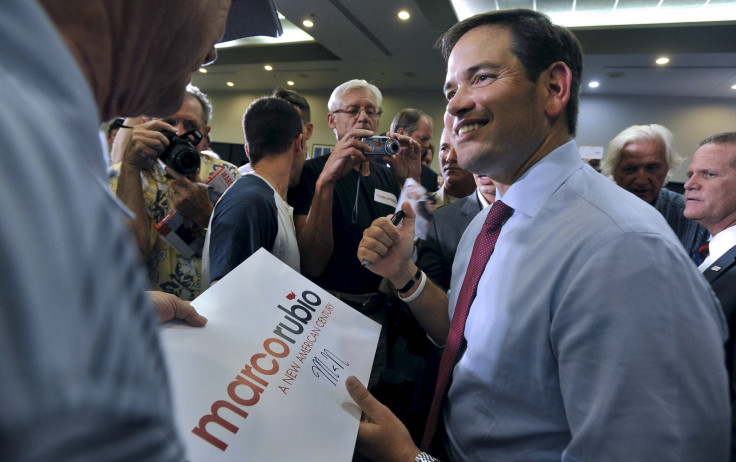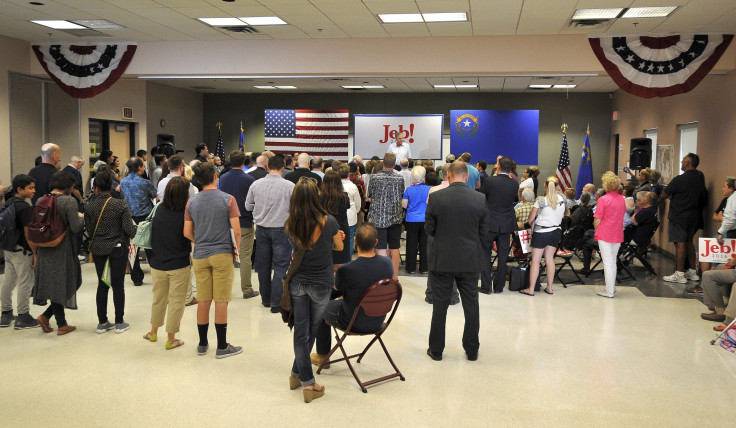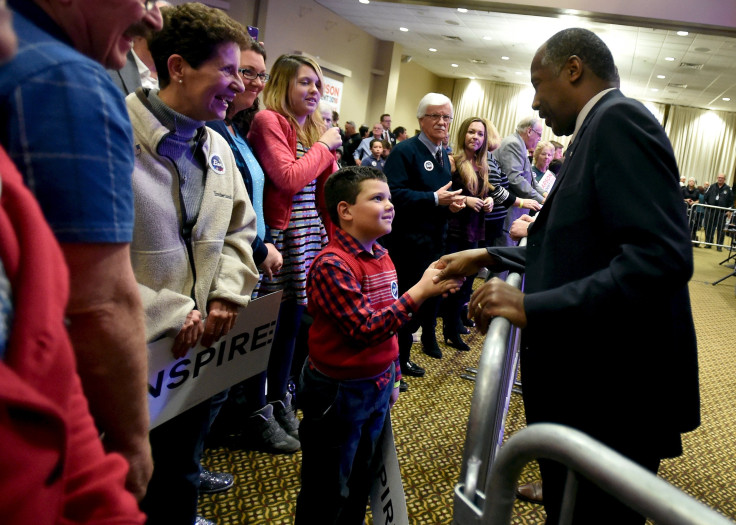The Mormon Vote In Nevada: Will The Republican Debate Help Any Of The Candidates Win The Group's Influential Support?

For Heidi Wixom, a Las Vegas Mormon seminary teacher and Republican political activist, the Bible and the Book of Mormon don't just teach about religious virtue and morality. Those holy books also guide her in her search for the right presidential candidate to vote for, as they do many others who share her faith.
“You need somebody who worships God. It needs to be somebody who isn’t just out to make money. It needs to be somebody who you know something about,” said Wixom, who is leaning toward voting for Florida Sen. Marco Rubio, relating Old Testament rules for picking leaders and kings to modern-day politics. “So, that’s what I look for, and, so, I have to tell you that I’ve been looking closely.”
Mormons in Nevada, the site of Tuesday night’s final GOP debate of the year, play an outsized role in the state’s caucuses and politics there in general. Even though they account for just over 4 percent of the state’s population, Mormons, or members of the Church of Jesus Christ of Latter-day Saints (LDS), have a high number of LDS lawmakers representing them in state offices. Their voters made up nearly a quarter of the state’s GOP caucusgoers in 2012. As the February 2016 Nevada caucuses draw closer, which candidate Mormons will support isn't yet clear from the unreliable polls that have been released, and observers say that the small but influential group could be much more fractured between candidates than when they banded together four years ago to give Mitt Romney 88 percent of their support to help him win more than 50 percent of the state.
Still, Nevada is the kind of place that could breathe new life into a flailing campaign if the first three nominating contests, in Iowa, then New Hampshire and South Carolina, are split among the numerous Republicans who may manage to stay in the race by February. Unlike primaries, caucuses require voters to show up and stick around for hours to register their opinion. Since doing so is a large time commitment, Mormons, who are generally well-informed and known for being good at mobilizing, tend to outperform other demographic groups. The Mormon Church, experts and Mormons say, fosters tightly knit social communities that encourage civic engagement and participation in things like politics.
“Mormons have always been a significant force,” Jon Ralston, a longtime political journalist in Nevada, said. “The Mormon population is relatively small, but the consensus is that they vote disproportionately to any other demographic. [Candidates] have gone out of their way to organize around Mormons knowing that it’s a significant turnout for the caucuses.”

Because the majority of Republican voters in Nevada live in sprawling suburbs or in towns spread throughout the expansive state, campaigning there takes a lot of time. Political endorsements are some of the best ways to appeal to potential supporters who might not be able to see the candidate in person. Rubio and former Florida Gov. Jeb Bush, political experts say, have focused more than others on wooing influential Mormon politicians in the state who can rally support behind their presidential campaigns and act as proxies.
Rubio's Christian faith, along with his Mormon upbringing and brief stint living in Nevada as a child, appeal to Mormon GOP voters, as do his strong positions on foreign policy. Perhaps just as important: Rubio has secured the support of Lt. Gov. Mark Hutchison, who has used his clout as one of the highest-profile Mormon politicians in the state to raise support for the young Floridian among LDS families.
"Marco Rubio, locally, is having the most success cutting into the LDS community at the moment, and I think a lot of that has to do with the lieutenant governor," said Cory Christensen, an LDS voter in Las Vegas and senior advisor to state Sen. Scott Hammond. Hutchison "is a pretty popular figure here [and] has really been working him pretty hard, representing him pretty well."
On the campaign trail, Rubio has stayed away from discussing his history with the Mormon Church, and many Mormon voters said that's probably a good thing.
"Right now I'm torn between Marco Rubio and [Texas Sen.] Ted Cruz," said Charlie Melvin, a professional homemaker in Las Vegas. Melvin said she's very interested in hearing more about Rubio's immigration plan and that her biggest voting issues were religious freedom, national security and immigration reform. She supports a pathway to citizenship for nonviolent and otherwise law-abiding undocumented immigrants.
"I love each debate when they come up because it gives me an opportunity to really get closer to picking a candidate. So I do look forward to tonight’s debate. I think each one is important," she said Tuesday.
Bush's institutional support in the state includes two of the top consultants who helped organize Mitt Romney's winning Nevada campaigns in 2008 and 2012. His organizing effort in Nevada is working furiously to secure the support Mormon leaders and prove that they're still in the race.
"I can tell you... that I am thoroughly displeased with the crop of GOP candidates and believe that placating to the outdated belief of who our base is has done considerable damage to our party," Dylan Todd, a Mormon and an attorney based in Las Vegas, said. "If I had to pick today, it would be Bush. He was governor when I lived in Florida and our state did well under him. But this country will not elect another Bush."
Ben Carson, who has made his Seventh Day Adventist beliefs an important part of his campaign, has also seen some support in Nevada. In the LDS temple around the corner from Wixom’s home, she said, she sees plenty of Carson bumper stickers affixed to the rear end of cars. Still, political operatives and experts aren't aware of specific campaign organizing in Nevada to turn out the retired doctor's supporters on caucus day.

The most recent poll in the state, conducted by CNN/ORC in early October, put business mogul Donald Trump and Carson in the lead in Nevada with 38 and 22 percent, respectively. They're followed by former Hewlett-Packard CEO Carly Fiorina (8), Rubio (7), Bush (6) and then Cruz (4).
Rubio has seen his stock rise in national polls since November, and currently comes in third place in the GOP field, according to averages of polls from Real Clear Politics. He's behind Trump, who has 33 percent, and Cruz, who takes in 16.1 percent. Carson has dropped dramatically over the past month. He was neck-and-neck for first place with Trump in early November but now places fourth with 12 points. Bush comes in fifth with just 4 percent of GOP voters nationally.
Quin Monson, a professor of political science at Brigham Young University, a prominent Mormon school in Provo, Utah, and co-author of the book "Seeking the Promised Land: Mormons and American Politics," isn't convinced that support for candidates like Trump and Cruz will last. Both candidates have made headlines for blasting power brokers in Washington, D.C., and linking Muslims to terrorism.
Their popularity is likely more of a protest against the political status quo, Monson said. What's more, tones of religious intolerance toward Muslims could turn off Mormon voters , many of whom are very aware of the intolerance members of their faith have endured in the past, Monson said.
“I think whoever rises to the top [of polls] that’s not Donald Trump and probably not Ted Cruz is the most likely candidate” to secure the Mormon vote, Monson said. “It sounds to me like that might be Marco Rubio. I think Ben Carson gets a lot of support from what I see on social media from Mormons, but I think that’s fading, like he is nationally. They’re looking for someone who is an electable, sensible conservative. Rubio is the candidate in that category that has the most momentum.”
© Copyright IBTimes 2024. All rights reserved.






















